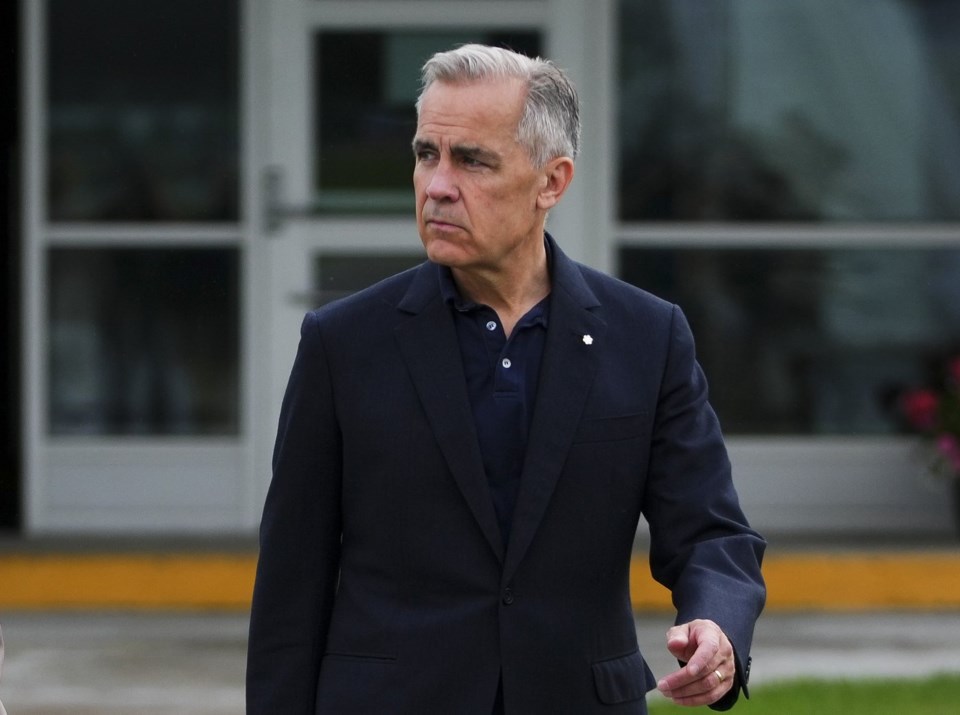OTTAWA — Prime Minister Mark Carney called for de-escalation on Sunday after the United States carried out strikes against three Iranian nuclear sites earlier in the day.
Carney issued a social media post shortly before 8 a.m. Eastern saying the U.S. military action was "designed to alleviate" threats posed by Iran, but the situation in the Middle East remains "highly volatile."
"Stability in the region is a priority," Carney said on the social media platform X.
"Canada calls on parties to return immediately to the negotiating table and reach a diplomatic solution to end this crisis."
The military intervention brings the United States into Israel's efforts to scuttle Iran's nuclear program and broadens fears of an escalating conflict.
Much of the global reaction to the U.S. strikes Sunday echoed calls for diplomacy, though many nations also made note of the dangers of Tehran's nuclear program.
Carney said in his post that Iranian nuclear ambitions pose a threat to international security and reiterated Canada's position that Iran must never be allowed to develop a nuclear weapon.
Carney cited a statement from G7 leaders coming out of the summit held in Alberta last week saying the solution to the Iranian crisis should involve a broader de-escalation of conflicts in the Middle East, including a ceasefire in Gaza.
Addressing the nation from the White House after the strikes, U.S. President Donald Trump asserted Iran’s key nuclear sites were “completely and fully obliterated.” There was no independent damage assessment.
It was not clear whether the U.S. would continue attacking Iran alongside its ally Israel, which has been engaged in a nine-day war with Iran. Israel also remains in conflict with Hamas, an ally of the Iranian regime.
Iran’s top diplomat, Foreign Minister Abbas Araghchi, warned in a post on X that the U.S. attacks “will have everlasting consequences” and that Tehran “reserves all options” to retaliate.
The Associated Press reported Iran fired a new volley of missiles into Israel in the hours after the U.S. strikes, destroying apartment buildings and homes in three cities and wounding at least 23 people.
Carney is in Europe with a cadre of cabinet ministers for a trip that's expected to be dominated by security and defence talks at the EU and NATO summits.
Speaking outside of a hotel in Brussels, Foreign Affairs Minister Anita Anand said she and other officials briefed the prime minister on Sunday's flight to Europe on the "very volatile" situation in Iran.
Anand said she highlighted numerous calls that she had with counterparts in Europe and the Middle East, including with the foreign minister of Iran.
On the call with her Iranian counterpart, Anand said she emphasized the importance of the safety and security of Canadians in the region as well as the importance of de-escalation. She said she also raised Flight PS752 — a passenger plane shot down by Iran in 2020, killing dozens of Canadians on board — in her conversation.
"The reality is, over the past decades Iran has been developing its nuclear capacity and it is a source of grave instability in the region," Anand said.
Anand said the government wants to see negotiations resume, a resolution to the issue and peace.
The minister said the government is ensuring that it has increased consular support throughout the region, including at borders.
The government is also making sure there are options for air travel and ground transportation wherever possible, Anand said.
She reminded Canadians in the area to register with Global Affairs Canada.
While the Iranian airspace is closed in the conflict, land border crossings into Turkey, Armenia and Azerbaijan are possible options for Canadians attempting to leave Iran, according to Global Affairs Canada.
Canadians in Israel, Gaza, the West Bank and Iran are "advised to remain close to a bomb shelter or a hardened structure away from windows," a Global Affairs Canada web page reads.
Conservative Leader Pierre Poilievre weighed in as well on Sunday.
"Allowing the genocidal regime in Iran to get a nuclear weapon would have been reckless. American and Israeli actions to stop it from getting one are 100% justified," he said in a post on X.
Poilievre called on the government to protect Canadians from "violence spilling into our communities at home" and from Iran's attempts to intimidate Canada's Jewish and Persian communities.
He also said he hopes the Iranian people "will rise up and put an end to this appalling regime so the people can live in freedom and the world can live in peace."
Canada has not called for regime change in Iran, but does not have diplomatic relations with the country. Then-Prime Minister Stephen Harper shuttered Canada's embassy in Tehran in 2012.
Canada listed the Iranian Revolutionary Guard Corps as a terrorist entity a year ago and has imposed sanctions against hundreds of individuals and entities in Iran over human rights violations and efforts to destabilize global peace.
In January, Justice Marie-Josée Hogue wrote in her final report on the Public Inquiry into Foreign Interference that Iran has not historically been a "significant foreign interference actor" in Canadian democracy.
She wrote that Iran instead relies on transnational repression campaigns to prevent criticism of its government.
The Canadian Security Intelligence Service said in its 2024 annual report released last week that Iran is liable to use proxies to target perceived enemies living in foreign states — including Canada.
"Iranian threat-related activities directed at Canada and its allies are likely to continue in 2025, and may increase depending on developments in the Middle East and the Iranian regime’s own threat perceptions," the report reads.
— with files from Dylan Robertson, Catherine Morrison in Brussels and The Associated Press
This report by The Canadian Press was first published June 22, 2025.
Craig Lord, The Canadian Press




